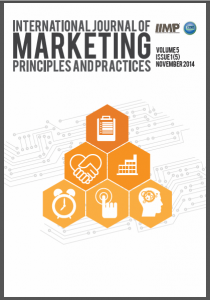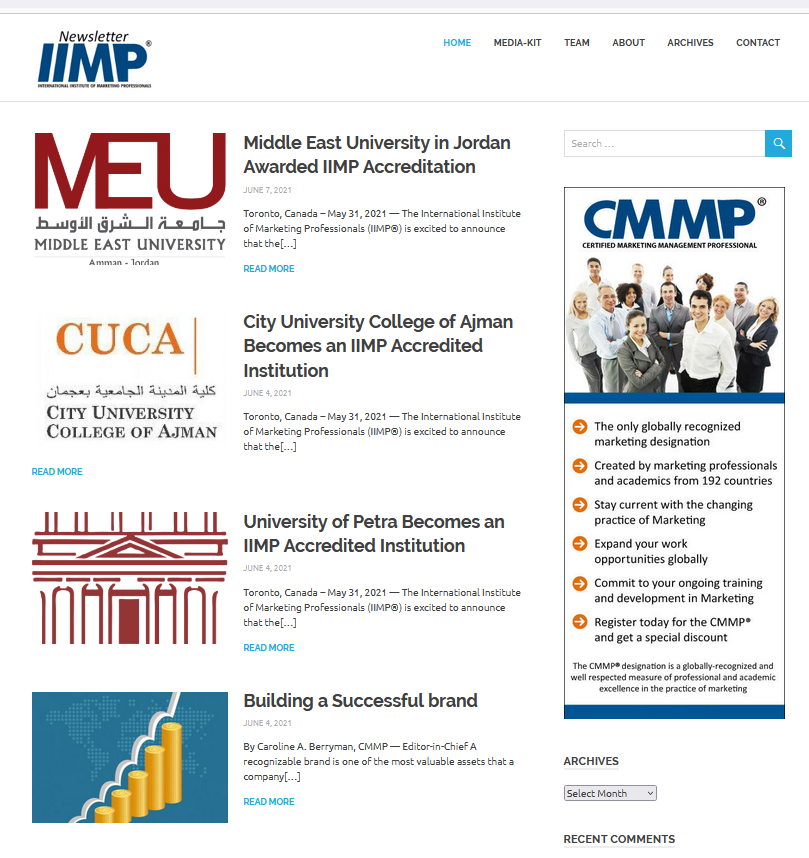Current Issue – International Journal of Marketing Principles and Practices – IJMPP
 International Journal of Marketing Principles and Practices
International Journal of Marketing Principles and Practices
Issue 5 – November 2014
Dear colleagues,
The fifth issue of the International Journal of Marketing Principles and Practices (IJMPP) highlights the diversity of marketing across countries, cultures, markets and institutions. The authors bring to your attention broad scope of marketing targets, models and efforts depending on local conditions, technological development and cross-border integration. One of the goals of the current issue is to provide broad picture of challenges which marketers meet in different business settings, and to urge for continuous enhancement of marketing knowledge leading to efficient strategies and decision making.
The articles cover new marketing models shaped by internet and mobile business, analyse behaviour of customers in transition economies, provide characteristics of marketing in the formal institutions, and attain higher conceptual level of strategic development.
The first article is presented by the international team of authors Dr. Anne-Flore Maman Larraufie (PhD), Victorija Gromova, and Dr. Alexandra Vignolles. The article analyses transformation of group buying from specific large business model to the marketing tool of small and medium enterprises. The article provides analysis of group buying characteristics and introduces original interpretation based on empirical research in the emerging online market of Latvia. The research builds insights for implementing marketing efforts in the area of group buying not only in Latvia but in similar countries which have recently joined EU and integrated to its technological and business networks.
The second article authored by Tamer A.Awad and Dina Ashraf El-Shihy presents transformation of push-marketing models to the new advertising medium of push notifications applied in mobile communication based marketing. The authors summarize the results of survey conducted among users of mobile services in Egypt for exploring the customers’ attitude to the push notification tools and their effect to the future shopping behaviour. The research implies to expanding usage of the push notification model due to its positive effect to the behaviour characteristics of perceived usefulness and ease of use.
The third article, presented by prof. Riteshkumar Dalwadi, carries big contrast to the technology-based marketing issues, as it analyses the preference parameters of customers for shopping at newly established organized retail stores rather than in traditional stores of India. The findings of the exploratory research performed in four majors cities of Gujarat state provide valuable information for further expansion of retail store network in India. The research enables to clearly differentiate among the customer preferences characterizing convenience of visiting the retail store and the type of goods intended to buy.
The fourth article by dr. Wail Alhakimi and Aayed Qasem deals with the characteristics of marketing in institutional settings. The article analyses marketing strategies fulfilled by private universities in less developed world, namely in the case of Yemen. The research results showed that level of utilization and effectiveness of marketing strategies in private universities of Yemen has not yet reached its full potential, especially in the area of market segmentation, which was not utilized and even not perceived to be very effective in recruiting students. However the survey showed increasing interest and effectiveness of implementing marketing strategies, and enabled to provide recommendations for the case of educational market in Yemen.
The fifth article prepared by Assoc.prof. Dr. Rehman Gul Gilal (Pakistan) and Phd candidate Rukhsana Gul (China) investigates patterns of working environment of commercial banking, which has recently become one of the most crucial service sectors in Pakistan. The research results show that the impact of working environment shaped by policies and procedures imposed by regularity authorities have extremely big impact to increasing stress level of employees, especially those having direct interaction with customer and dedicated to fulfilment of their requirements.
The sixth article suggested by Alfred Riashy builds on the theoretical foundations of marketing area by providing conceptual framework of six dimensions for competitive strategy, or the Six D’s. The theoretical model and illustrative examples provided by the author brings original insights to the discipline and encourages discussion among the researchers of highly diverse and challenging marketing field.
Our greatest respect and gratitude is addressed to the authors of the articles and to the team of reviewers who devoted their efforts and generous advice to the researchers.
Assoc.prof. Dr. Dalia Kriksciuniene
Editor-in-Chief of IJMPP
International Institute of Marketing Professionals
___________________________________________________________________________________
Subscribe to the IJMPP to receive full issue
